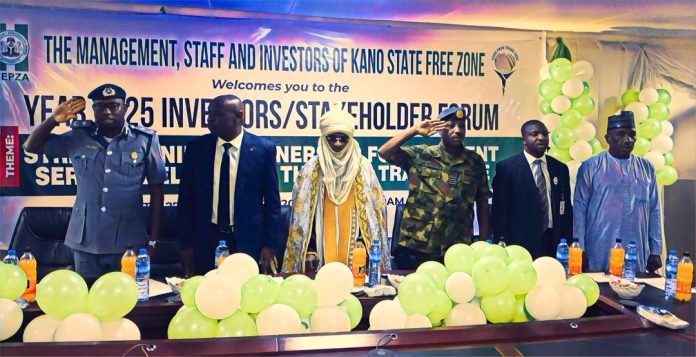KEY POINTS
• Kano Free Zone revenue growth highlights expanding non-oil activity.
• Kano Free Zone revenue growth reflects improved regulatory cooperation.
• Kano Free Zone revenue growth strengthens investor confidence.
The Kano Free Trade Zone generated almost N18 billion in revenue from January to October 2025, as activities within the hub expanded in manufacturing, processing, and export operations. The data was revealed on Wednesday by the Nigeria Export Processing Zones Authority, which regulates free trade zones across the country, in conjunction with the Nigeria Customs Service, whose collections constitute the majority of revenue earned from the facility.
Kano free zone revenue growth
Olufemi Ogunyemi, managing director of NEPZA, informed investors and regulators at the 2025 Kano Free Trade Zone Investors and Stakeholders Forum that the zone generated approximately N1.8 billion internally during that period. He stated that Customs receipts amounted to N17 billion, indicating increased throughput and enhanced compliance among enterprises operating in the zone. The two-day summit in Kano included businesses, government ministries, and regulatory agencies to evaluate operations and enhance collaboration among organizations tasked with upholding standards throughout the region.
Ogunyemi stated that the revenue performance indicates the zone’s contribution to the expansion of non-oil industrial output. He stated that investment in the facility has consistently increased as manufacturers and service companies capitalize on its incentives and processing framework. He asserts that the consistent rise indicates confidence among businesses who perceive the zone as integral to a larger initiative to expand Nigeria’s economic foundation.
Kano free zone revenue performance
Regulatory officials utilized the gathering to reaffirm standards for product quality and safety. Kassim Ibrahim, the Kano State coordinator for the National Agency for Food and medicine Administration and Control, advised enterprises to comply with established standards in food and medicine production. He cautioned that deficiencies extend beyond the detriment to individual companies and undermine the nation’s standing in export-driven markets. The agency intends to conduct unannounced inspections to enhance its post-marketing surveillance.
Richard Bassi, the head of the Kano Free Trade Zone, stated that the advancements achieved in the last year are attributable to enhanced collaboration among NEPZA, NAFDAC, Customs, and other agencies operating within the zone. He stated that collaboration has been important in sustaining investor confidence, especially as an increasing number of enterprises show interest in the facility.
According to The Guardian, forum discussions centered on economic diversification through the expansion of non-oil businesses and the enhancement of efficiency within the zone. The “One Stop Shop” approach, which consolidates clearances from Immigration, Customs, NAFDAC, and the Standards Organisation of Nigeria, was emphasized as a feature that facilitated the streamlining of processing processes.



